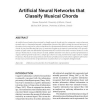93 search results - page 10 / 19 » Evolving neural networks in compressed weight space |
GECCO
2005
Springer
15 years 7 months ago
2005
Springer
Recurrent neural networks are theoretically capable of learning complex temporal sequences, but training them through gradient-descent is too slow and unstable for practical use i...
105
Voted
NIPS
1993
15 years 3 months ago
1993
This paper introduces GNARL, an evolutionary program which induces recurrent neural networks that are structurally unconstrained. In contrast to constructive and destructive algor...
135
click to vote
ANNPR
2008
Springer
15 years 3 months ago
2008
Springer
Clustering constitutes an ubiquitous problem when dealing with huge data sets for data compression, visualization, or preprocessing. Prototype-based neural methods such as neural g...
128
Voted
GECCO
2008
Springer
15 years 2 months ago
2008
Springer
This paper presents an study about a new Hybrid method GRASPES - for time series prediction, inspired in F. Takens theorem and based on a multi-start metaheuristic for combinatori...
114
click to vote
IJCINI
2008
15 years 1 months ago
2008
An artificial neural network was trained to classify musical chords into four categories--major, dominant seventh, minor, or diminished seventh--independent of musical key. After ...

